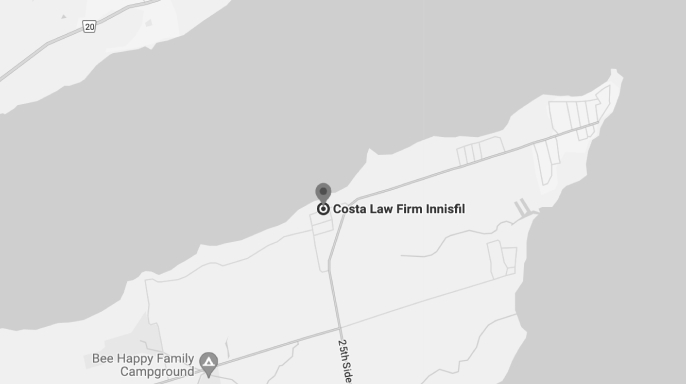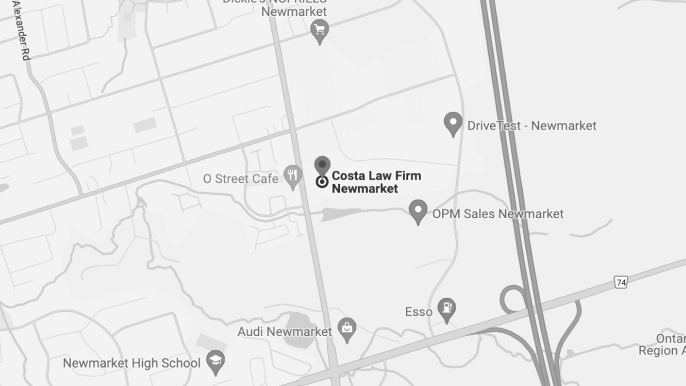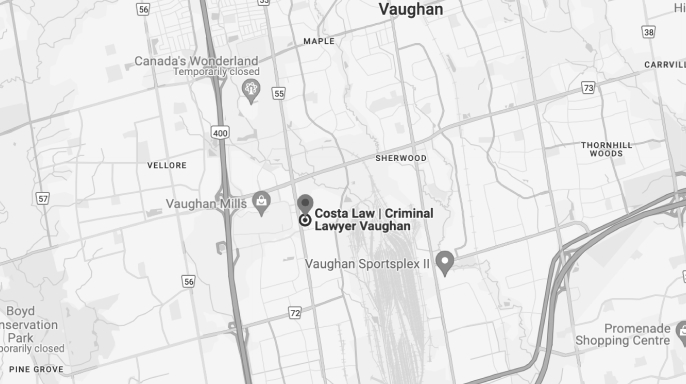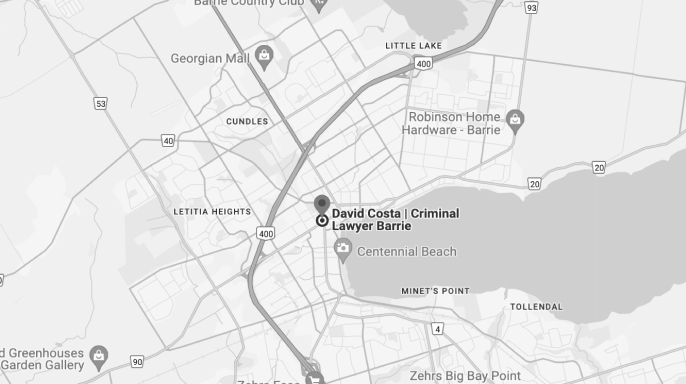Sexual Assault Lawyer Toronto: Expert Criminal Defence
Costa Law is a reputable law firm with a dedicated team of criminal defence lawyers Toronto. We understand the sensitivity and gravity of sexual assault charges Toronto and work tirelessly to protect the rights of our clients.
Our sexual assault defense lawyer Toronto aims to provide aggressive and comprehensive sexual assault legal representation Toronto to achieve the best possible outcomes for our clients.
Sexual assault charges are becoming more frequent, and the legal rights afforded to the complainants are currently stronger than ever.
That’s why fighting such charges can be challenging. However, our experienced sexual assault lawyers Toronto can help you fight the charges and achieve the best possible results.
We have a deep understanding of Canada’s Criminal Code and the legal processes associated with sexual crime charges Toronto. Indeed, we are better equipped to protect your rights and guide you through this difficult time.

What to do if you are Facing Sexual Assault Allegations
Despite the recent changes in sexual assault laws Canada, it’s still possible to mount a compelling defence against allegations of sexual assault. However, the key to success is an early team-up with the experienced criminal lawyers Toronto at Costa Law.
We have an experienced sexual assault lawyer Toronto who can assess the circumstances surrounding your sexual assault case and carefully derive a litigation strategy.
It’s recommended to schedule a free consultation sexual assault lawyer Toronto with us soon after you are aware of the allegations of a violent sexual encounter. We understand that no two sexual offence charges are the same.
That’s why our lawyers must understand the details of your sexual assault case so that we can customize our detail-oriented response depending on the nature of your charges.

What our Lawyers can do for you
If you are facing sexual assault charges Toronto, our experienced criminal defence lawyers Toronto are in a better position to fight for your rights. Here is how our Sexual Assault Lawyer near me can help:
Appear in Court for You
An experienced criminal defence lawyer Toronto may appear in court on behalf of a client by way of designation of counsel. You (the accused person) can provide our lawyer with a signed designation allowing the legal professional to appear and act on your behalf for court proceedings.
This is particularly helpful for routine court appearances, administrative processes, and when you want to avoid undue attention from the media.
If you do not want to appear physically in court, our sexual assault lawyer Toronto will firmly stand in your place and appear in court on your behalf during all legal proceedings as long as the law allows it.
Indeed, our legal representation minimizes the need to physically appear in court during these emotional and stressful times. Furthermore, you will have the time to focus on your well-being while our sexual assault defense lawyer Toronto handles the complex legal processes for you.
Fight for Your Rights
Canadians facing sexual assault charges or allegations need to take action to protect their rights while planning their legal defence. Whether these allegations are true or false, the most effective way to protect yourself is to hire a sexual assault lawyer Toronto.
Our knowledgeable lawyers usually recommend keeping a written, detailed, and accurate account of the incident, all conversations, text messages, and emails. You must keep this information confidential and only share it with our lawyer.
It’s also important that you work with our lawyers to identify all potential witnesses, communications, and documentary evidence that can strengthen your defence.
Avoid speaking to the police officers unless your criminal defence lawyer Toronto is present. While most people think that cooperating with the police will help their cases, the information you share with the law enforcement department may be used against you in a courtroom.
Accusations of sexual violence can lead to a challenging and emotional time. We recommend taking proactive steps to protect yourself, and seeking counsel from our skilled legal team will increase your chances of winning.
Protect You
A sexual assault accusation Toronto or trial attracts media coverage that can be damaging to the accused person, whether the accusations are true or not.
This is particularly true if the person accused of sexually assaulting the victim has a high-profile career or is a public figure. In such cases, we can seek a publication ban Toronto to protect your rights and ensure you get a fair and just trial.
A publication ban is an order from the court that limits or prohibits the broadcasting, publishing, and sharing of information that could identify a witness, victim, accused person, or any other person involved in a case related to sexual violence. Such information includes addresses, names, and other identifying details.
The purpose of publication bans Toronto is to protect the privacy and rights of all individuals involved in the case. This way, a fair and just trial can happen.
In Canada, the defence, court, or prosecution can request a publication ban at any stage of the legal proceedings. The court will hold a publication ban hearing. If it decides that the ban is necessary for a fair trial, the publication ban will be in place for the period of the trial and lifted once the sexual assault trial process is concluded.
Fight the Charges of Sexual Offences
At Costa Law, our Sexual Assault Lawyer Toronto understands the importance of fighting the allegations and charges of sexual offences Toronto, such as sexual touching, child pornography, sexual exploitation, sexual interference, and other sexual offences.
If found guilty of any unwanted sexual contact charge, the consequences can be severe and long-lasting.
A conviction can result in hefty fines, a prison sentence, an appearance in the sex offenders registry, and a criminal record that can negatively affect different aspects of your personal and professional life.
It’s important to note that you are presumed innocent until the prosecutor proves beyond a reasonable doubt that you are guilty.
Thus, the burden of proof falls on the prosecution, who should present evidence that you committed the alleged sexual offences Toronto. The right to be presumed innocent until proven guilty is a fundamental criminal law principle that ensures every accused person gets a fair trial.
The Costa Law legal team specializes in fighting sexual assault charges Toronto. Our Sexual Assault Lawyer Toronto have many years of experience and a wealth of criminal law knowledge Toronto.
We will use all legal means to fight the criminal charges against you. Remember, our sexual assault defense lawyer Toronto could make a significant difference in the outcome of your case and protect your rights.
When Appropriate, Get the Charges against You Dropped
As mentioned, you are presumed innocent until proven guilty. The first and most important step in proving your innocence is to consult our sexual assault lawyer Toronto.
If you are wrongfully accused, arrested, and charged with sexual assault, we will assess the available evidence. Based on the credibility of the evidence, we will push for the sexual assault charges Toronto to be dropped by the prosecuting office.
However, if the alleged sexual crimes are serious, the prosecutor may be reluctant to drop the charges or negotiate even if the case has weaknesses.
For low-level sexual assault cases, our lawyers can convince the prosecution to drop the criminal charges, particularly if you agree to a peace bond Toronto or apply for a discharge. This will require you to have a clean criminal record or an old record of minor charges. Here are different ways to get your charges dropped.
Peace Bond
This is a protection order that a court makes, particularly in most sexual assault cases Toronto with no reasonable grounds to believe the alleged criminal offence has been committed.
Once you’re offered the opportunity to sign a peace bond, the sexual assault charges against you will be withdrawn as long as you abide by certain conditions. Remember, the court will consider the severity of the alleged crime and your past criminal history.
Conditional or Absolute Discharge
A conditional or absolute discharge means that you’re proven guilty but will avoid major consequences of a permanent criminal record, jail time, and listing in the national sex offenders registry.
If you are given a conditional discharge, you must remain on probation (with certain conditions) for a specific period. The discharge will be removed from your record after three years.
An absolute discharge means you’re released without probation or other conditions. Thus, the discharge remains on your criminal record for a year. Remember, neither conditional nor absolute discharge is available if the alleged crime is a high-level sexual assault Toronto.
Suspended and Intermitted Sentences
A peace bond or discharge is unavailable unless you are accused of minor sexual assault charges Toronto, and you will have to accept the record that comes with a ‘guilty verdict.’ However, even if you get convicted of a high-level criminal offence of a sexual nature, alternative sentencing options may help reduce your jail term.
A suspended sentence is similar to probation. That means you will be released from jail with strict conditions. On the other hand, you can serve your intermitted sentence over the weekends so that you can continue working.
At Costa Law, we have highly experienced sexual assault lawyers Toronto whose priority is to protect your rights. We will assess the personal circumstances and the details of your case. Our sexual assault defense lawyer toronto will also evaluate the available evidence and the strength of the case against you. This way, we can push for case dismissal under the most appropriate option.
Understanding Sexual Assault Charges
Section 271 of Canada’s Criminal Code defines sexual assault Toronto as any sexual activity that occurs with another individual without consent. Thus, there must be force used or a threat of force, and no consent to the sexual act from the alleged victim.
That means the victim’s sexual integrity must be violated for the accused person to be found guilty of sexual assault charges Toronto.
This charge covers a wide range of behaviours from seemingly minor sexual offences Toronto, such as unwanted touching and kissing, to serious offences like fondling, groping, grabbing, rape, gang sexual assault, sexual harassment, certain sex offences like child pornography, and other sexual offences.
Even when there was no physical touching of the alleged victim, according to the Criminal Code, a threat of force can be enough to press sexual assault charges Toronto. Here are the factors considered when classifying the seriousness of a sexual assault charge Toronto:
- The ages of the alleged sex offenders and victims
- The circumstances leading to the incident are considered assault
- Facts surrounding the alleged victims’ sexual violation
- The nature of the sexual threats or contact made by the alleged sex offenders
- The part or region of the body touched
- Whether the victim suffered physical harm
- A combination of force and threats
- Words or gestures indicating that the sexual intercourse or encounter was non-consensual
- First-time or repeat offence for the alleged sexual offenders
All crimes classified as sexual assault Toronto are non-consensual. According to the Criminal Code, the age of consent in Ontario is set at 16. That means no one below this age can consent to activities for sexual purposes. Here are the main types of sexual assault charges Toronto:
Common Sexual Assault
This is the most common type of sexual assault charges Toronto. It occurs when an assault of a sexual nature happens but doesn’t result in physical harm. This broad offence is often left vague in Canada’s Criminal Code as it only references the victim’s sexuality being violated.
Penalties for this sex crime Toronto range from a year (the lowest possible sentence) to 14 years imprisonment if the victim is a young person below the age of consent (16 years) and up to a 10-year imprisonment if the victim is over 16 years.
Sexual Assault – with a Weapon, Causing Bodily Harm, or Threats
Any charge involving sexual assault Toronto that causes physical harm to the victim is often taken seriously. This is particularly true if the alleged sex offenders used a threat of harm or a weapon.
These charges are even treated more severely if a prohibited or restricted weapon is used. If you are facing sexual assault charges Toronto of this nature, it’s recommended to consult a sexual assault lawyer near me for legal counsel.
People convicted of sex offences Toronto with a prohibited or restricted weapon face a minimum prison sentence of five to seven years. The imprisonment period depends on whether it’s a first-time or repeat offence.
The offenders can face up to 14 years in prison. For sexual assault with a non-prohibited or restricted weapon Toronto, convicted sex offenders face a minimum imprisonment of four years and up to 14 years imprisonment.
Aggravated Sexual Assault
Suppose the sexual assault victim suffered severe injuries – disfigurement, endangerment of their life, or maiming. In that case, the alleged sex offender may be charged with aggravated sexual assault Toronto. This is the most serious type of sexual offence Toronto and can lead to life imprisonment.
If a restricted weapon was involved and this was the accused person’s first offence, the penalty is a 5 to 7-year prison sentence. However, if a restricted weapon was involved, the accused person faces a prison sentence of four years (minimum) and up to 14 years in prison.
Our Sexual Assault Lawyer Toronto believe that not everyone charged with crimes related to sexual activity is guilty. Sometimes, false allegations are made. Furthermore, some alleged victims have a motive to lie in court, and our criminal lawyers Toronto can expose such issues.
There have been also cases of mistaken identity. So working with our experienced criminal lawyer Toronto can be a significant deciding factor between an acquittal and conviction.
The Legal Elements of Sexual Assault Charges
So, what must the prosecutor prove to secure a conviction for any sexual assault charge Toronto? According to Canada’s Criminal Code, the Crown prosecution must prove all elements of a sexual assault Toronto beyond reasonable doubt. If there’s a doubt concerning these elements, the jury or judge trying the case is legally required to acquit you.
Unfortunately, the sexual assault law Toronto is complex, and each element is subject to considerable litigation. That’s why you need an experienced criminal lawyer Toronto on your side. Here are the key elements of sexual assault charges Toronto:
Intentional Application of Force
The force applied doesn’t have to be violent or the accused gain sexual gratification for the prosecution to secure a conviction for sexual assault Toronto. It can even be gentle, non-consensual touching like groping or rubbing.
It can include indirect contact – for instance, a touch using a stick or another object. However, the application of force must be intentional – not an involuntary act or accident.
Absence of Consent
Here, the main question concerns the alleged victim’s state of mind. If the jury or judge believes that the plaintiff (victim) didn’t consent in their mind to the sex activity in question, the case is settled.
Remember, consent should be voluntary. It can’t be the result of coercion, abuse of authority or position by the defendant (accused individual) towards the complainant, fraud, or threats.
Thus, it’s not a defence that the complainant consented, even if they didn’t use the actual words of consent.
Besides, the jury or judge will assess the totality of the available evidence concerning the state of mind of the complainant. If the jury believes the victim did not consent to sexual activity, they’ll move to the other elements of the case analysis.
Knowledge that the Victim didn’t Consent
In the context of unwanted sexual activity, the accused’s knowledge of the absence of consent to sexual activity may take different forms. It means awareness that the other party wasn’t consenting to the touching, kissing, groping, or any activity for a sexual purpose because he or she said so.
However, knowledge can also mean that the accused individual was willfully blind concerning the complainant’s consent to sexual activity or was reckless.
These concepts are linked and refer to a situation where the accused individual knows there’s a risk that the victim isn’t consenting but proceeds with the sexual activity anyway.
Luckily, an honest but mistaken belief of consent to sexual activity is a defence in sexual assault Toronto cases.
Our criminal lawyer Toronto will investigate the incident and assess the available evidence to determine whether the honest but mistaken belief defence applies to your case. Sexual assault defense lawyer Toronto can argue that you honestly but mistakenly believed that the alleged victim was consenting to the activity in question.
In Canada, however, consent must be communicated clearly, either in conduct or words. Therefore, an individual charged with sexual assault Toronto can’t rely on passivity, ambiguous conduct, or silence as the basis for the defence of mistaken belief in consent.
Furthermore, the mistaken belief defence can’t apply if the victim is intoxicated to the point of being unable to consent to sexual activity freely.
Sexual Nature of the Force
There are cases when the nature of the alleged activity will be a concern. For instance, ‘sexual’ touching often refers to any form of non-consensual touching that violates the integrity of the victim’s sexuality.
The concern is whether the sexual nature of the alleged non-consensual touching would be apparent to any observer.
The jury or judge will consider the body part touched, the circumstances surrounding the incident, the relationship between the accused and the victim, any form of communication between the parties, and more.
Regardless of the details of your case, our criminal lawyer Toronto can prepare you at an early stage for all eventual litigation processes. Our Sexual Assault Lawyer Toronto can investigate sexual offences Toronto and understand the available evidence. Remember, our priority is to protect your right to a fair trial and freedom.
The Consequences of a Sexual Assault Conviction
Once you are convicted of sexual assault Toronto, it’s not only the imprisonment you have to worry about. Other long-term consequences affect your professional and personal life. These include:
- A life-long criminal record that will negatively affect your immigration status (for non-citizens), employment, and education.
- Not being allowed near kids. This may include restrictions on employment and residence, particularly if the victim is a young person under 16 years old.
- Restrictions on the weapons you can access and use.
- Internet access restrictions, especially if you are convicted of certain sex offences related to the internet, like child pornography offences Toronto.
If convicted of sexual assault Toronto, a jury or judge must make a sex offenders registry order that requires sex offenders to provide their information in the provincial or national sex offender registry.
This database provides identification information and other details about all convicted sex offenders. It allows the criminal justice system to track sex offenders.
Note that sex offender registry orders often last ten years if your offence was prosecuted by summary conviction.
However, if you are serving the maximum term of 2 to 5 years imprisonment for the sex offence, your information will last ten years in the sex offenders registry.
For those serving a maximum imprisonment of ten to 14 years, their information will last 20 years in the sex offenders registry.
Similarly, sexual assault convicts Toronto serving life imprisonment will have their information in the sex offenders registry for life. Remember, the offenders are required to report annually and notify the law enforcement officials if they intend to travel away from their address for over seven days.
Generally, the imprisonment, appearing in the sex offenders registry Toronto, and other consequences of a sexual assault conviction Toronto are severe. That’s why you need an experienced sexual assault defence lawyer Toronto to help you understand all your legal options and protect your rights.
Seek Legal Representation
If you are accused or charged with sexual exploitation Toronto, unconsented sexual intercourse, or facing other sexual assault allegations Toronto, you must hire an experienced lawyer for sexual assault lawsuits Toronto.
Costa Law is a reputable sexual assault law firm Toronto that has handled many sexual assault trials Toronto successfully.
Indeed, we have helped many people accused of unwanted sexual touching Toronto, sexual interference Toronto, and other sexual assault offences Toronto, and we can help you.
Sexual Assault FAQ
What options do you have when you have been charged with a sexual assault offence?
If you or a loved one has been charged with a sexual assault offence Toronto, the first step is to contact a criminal defence lawyer Toronto. Your lawyer will request the Crown Attorney to provide a complete investigative file, often known as disclosure, which helps to highlight the circumstances of the case.
This file will include all documentation of the offense, including the police reports, witness statements, and complainant’s statements, as well as photographs and video statements.
This disclosure will be reviewed by the lawyer to determine the risk of going to trial versus accepting a negotiated plea deal.
The lawyers will look at several factors, such as the odds of winning the case at trial based on the police reports and the complainant’s version of the events. All these matters will be discussed with the client during various meetings, and you will be advised on what the best options are.
What’s Next After a Trial Date is Set?
The trial process for sexual assault charges Toronto is usually long. If a date is set today, expect the trial to take place about 6 to 8 months later. This gives the criminal lawyers Toronto ample time to prepare your case.
The legal team will review legal and factual issues that could impact the outcome of the case before trial. Our lawyers often source third-party records, such as the victim’s counseling or psychiatric records, which can help with the case.
When the trial date arrives, the Crown calls the case and witnesses. The defence team cross-examines all witnesses and points out evidence which helps to prove that the accused is not guilty.
The accused or other defence witnesses may also testify after the Crown completes calling its case. The Crown and defence then make closing arguments.
Depending on the severity of the allegation, a judge alone or a jury can decide the case. The court process is long, and even though many of our clients want a quick resolution, it’s important to understand that proper preparation is key.
Prep work can involve hundreds of hours, especially for bigger sexual assault cases Toronto. Having an experienced criminal defence lawyer Toronto by your side is important to get the best possible results for your case.
How Do You Prepare for the Initial Court Appearance?
The first court appearance is usually for the lawyers Toronto to review the file and figure out the direction that they are going to take the case.
The client may not have to appear in all remand court dates. Towards the end of the date, court process, the defence counsel will need to select a date(s) for a negotiated guilty plea, pre-trial date, or preliminary hearing, and a trial date(s).
A judicial pre-trial is a meeting with the judge to discuss all the aspects of the case. In this meeting, the criminal defence lawyer Toronto, the Crown, and an independent judge are present.
They may discuss what the Crown may be offering the client if they plead guilty as well as set the court time estimates and trial issues. If the Crown makes a reasonable offer, the accused may choose to take the offer and avoid going to trial.
What Happens After the Remand Appearances and a Judicial Pre-Trial?
If the Crown has made a good offer, your criminal defence lawyer Toronto may weigh the risk(s) of going to trial and advise on you accepting the offer. If not, the lawyer may recommend proceeding to trial, or to a preliminary hearing.
A preliminary hearing is not a trial. It is meant to determine if there is sufficient evidence to proceed to trial. Witnesses will testify to the Crown in court, and the defence team will examine the witnesses.
The defence team can use this to their advantage as it gives them an opportunity to learn about the case and find inconsistencies or improbabilities that may help if the case proceeds to trial. The defence can use the information they obtain during the preliminary hearing to pin down the evidence and to develop a winning strategy.
What is Considered ‘Consent’ to Sexual Activity?
A complainant may testify that there was no consent to engage in sexual activity. If this is the case, the court will analyse the complainant’s state of mind at the time of consent.
The complainant’s consent may have ended at the point where s/he became unconscious or unable to provide their consent.
A common situation occurs if the complainant was completely drunk or under the influence of drugs, and is thereby out of consciousness or unaware of their surroundings.
Is it still a Sexual Assault if the Adult Complainant Consented?
If an adult victim consented, then it is not a sexual assault Toronto. However, the Crown must prove beyond a reasonable doubt that the adult did not consent to the sexual activity in question.
The complainant will be cross-examined, including your Criminal Harassment Attorney Toronto, by the defence counsel in an attempt to create a reasonable doubt that there was some form of consent, or that it did not happen at all, among other references.
Will I go to Jail if I Plead Guilty or if I am Found Guilty of a Sexual Assault Charge?
Sexual assault charges Toronto vary from minor incidents to serious offences, such as sexual intercourse with a child or adult. Jail terms are likely for all kinds of sexual offences Toronto, but one may negotiate sentencing on very minor sexual assault charges Toronto.
The length of the jail term, if applicable, will depend on the nature and severity of the offence, as well as other factors like (whether the accused has a previous criminal record). An accused person of previous good character may avoid or face a shorter length of jail term.
The courts have developed some ranges of sentences for sexual assault charges Toronto. For instance, someone facing a date rape charge that involves no injuries can face 2-3 years of imprisonment. Serious offences can attract 6 to 10 years or more in jail.
Some cases result in a house arrest where the sexual offence Toronto in question is not a serious personal injury offence and does not carry a minimum term of imprisonment.
For those who are sentenced for less than 2 years in jail, the court usually demands a probation period of 3 years, which ensures they are under supervision after being released from prison. There are many other conditions which can be imposed (SOIRA), including a sexual abuse registry for a determined length of time.
Additional FAQs
1. How soon should I hire a sexual assault lawyer Toronto?
It’s recommended to contact a sexual assault defence lawyer Toronto immediately after being charged to protect your rights and prepare an effective defence.
2. Can a sexual assault charge be dropped?
Yes, in some cases, charges can be withdrawn or negotiated if the evidence is weak, or a peace bond or conditional discharge is applicable. Criminal lawyers Toronto can help evaluate this.
3. Will my case go to trial?
Not always. Many sexual assault cases Toronto are resolved through pre-trial negotiations, plea deals, or conditional discharges. Your criminal defence lawyer Toronto will guide you.
4. Can I avoid jail time for minor sexual assault charges?
Yes. For minor sexual assault offences Toronto, alternative sentencing options like probation, conditional discharge, or suspended sentences may be available.
5. How do publication bans work in sexual assault cases Toronto?
A publication ban protects the identities of the accused, victims, and witnesses. Your sexual assault lawyer Toronto can apply to ensure privacy during court proceedings.
Request A Consultation
Testimonials
What our clients are saying
Contact Us
Costa Law Firm
Costa Law Firm is a law firm located in Toronto with exceptional credentials that stands out for its commitment to client service. Our service minded approach has led Costa Law Firm to be one of the most reliable law firms in Toronto.
Address
Main Office:
1015 Bloor Street West, Toronto, Ontario M6H 1M1
Phone: (416) 535-6329
Fax: 416-535-4735
info@costalawfirm.ca
We provide emergency services for urgent matters.
Consultation Office:
17075 Leslie St Unit 6, Newmarket, ON L3Y 8E1Vaughan location 290 Caldari Rd Unit 8, Concord, ON L4K 4J4, CanadaBarrie location 49 High St 3rd floor, Barrie, ON L4N 5J4, Canada











